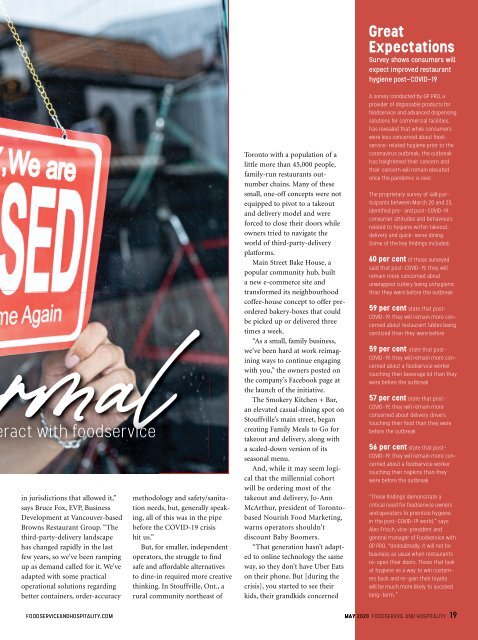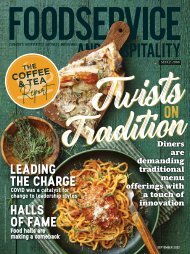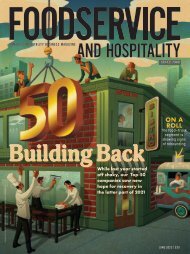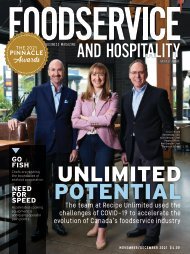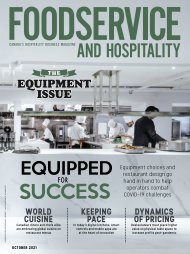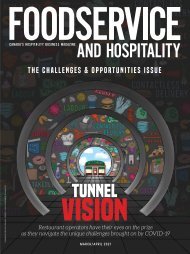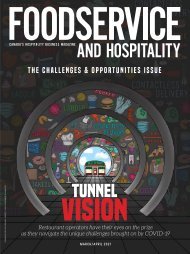May 2020
May 2020 issue of Foodservice and Hospitality magazine.
May 2020 issue of Foodservice and Hospitality magazine.
You also want an ePaper? Increase the reach of your titles
YUMPU automatically turns print PDFs into web optimized ePapers that Google loves.
mal<br />
ract with foodservice<br />
in jurisdictions that allowed it,”<br />
says Bruce Fox, EVP, Business<br />
Development at Vancouver-based<br />
Browns Restaurant Group. “The<br />
third-party-delivery landscape<br />
has changed rapidly in the last<br />
few years, so we’ve been ramping<br />
up as demand called for it. We’ve<br />
adapted with some practical<br />
operational solutions regarding<br />
better containers, order-accuracy<br />
methodology and safety/sanitation<br />
needs, but, generally speaking,<br />
all of this was in the pipe<br />
before the COVID-19 crisis<br />
hit us.”<br />
But, for smaller, independent<br />
operators, the struggle to find<br />
safe and affordable alternatives<br />
to dine-in required more creative<br />
thinking. In Stouffville, Ont., a<br />
rural community northeast of<br />
Toronto with a population of a<br />
little more than 45,000 people,<br />
family-run restaurants outnumber<br />
chains. Many of these<br />
small, one-off concepts were not<br />
equipped to pivot to a takeout<br />
and delivery model and were<br />
forced to close their doors while<br />
owners tried to navigate the<br />
world of third-party-delivery<br />
platforms.<br />
Main Street Bake House, a<br />
popular community hub, built<br />
a new e-commerce site and<br />
transformed its neighbourhood<br />
coffee-house concept to offer preordered<br />
bakery-boxes that could<br />
be picked up or delivered three<br />
times a week.<br />
“As a small, family business,<br />
we’ve been hard at work reimagining<br />
ways to continue engaging<br />
with you,” the owners posted on<br />
the company’s Facebook page at<br />
the launch of the initiative.<br />
The Smokery Kitchen + Bar,<br />
an elevated casual-dining spot on<br />
Stouffville’s main street, began<br />
creating Family Meals to Go for<br />
takeout and delivery, along with<br />
a scaled-down version of its<br />
seasonal menu.<br />
And, while it may seem logical<br />
that the millennial cohort<br />
will be ordering most of the<br />
takeout and delivery, Jo-Ann<br />
McArthur, president of Torontobased<br />
Nourish Food Marketing,<br />
warns operators shouldn’t<br />
discount Baby Boomers.<br />
“That generation hasn’t adapted<br />
to online technology the same<br />
way, so they don’t have Uber Eats<br />
on their phone. But [during the<br />
crisis], you started to see their<br />
kids, their grandkids concerned<br />
Great<br />
SLUG HERE<br />
Expectations<br />
Survey shows consumers will<br />
expect improved restaurant<br />
hygiene post-COVID-19<br />
A survey conducted by GP PRO, a<br />
provider of disposable products for<br />
foodservice and advanced dispensing<br />
solutions for commercial facilities,<br />
has revealed that while consumers<br />
were less concerned about foodservice-related<br />
hygiene prior to the<br />
coronavirus outbreak, the outbreak<br />
has heightened their concern and<br />
their concern will remain elevated<br />
once the pandemic is over.<br />
The proprietary survey of 468 participants<br />
between March 20 and 23,<br />
identified pre- and post-COVID-19<br />
consumer attitudes and behaviours<br />
related to hygiene within takeout,<br />
delivery and quick-serve dining.<br />
Some of the key findings included:<br />
60 per cent of those surveyed<br />
said that post-COVID-19, they will<br />
remain more concerned about<br />
unwrapped cutlery being unhygienic<br />
than they were before the outbreak<br />
59 per cent state that post-<br />
COVID-19, they will remain more concerned<br />
about restaurant tables being<br />
sanitized than they were before<br />
59 per cent state that post-<br />
COVID-19, they will remain more concerned<br />
about a foodservice worker<br />
touching their beverage lid than they<br />
were before the outbreak<br />
57 per cent state that post-<br />
COVID-19, they will remain more<br />
concerned about delivery drivers<br />
touching their food than they were<br />
before the outbreak<br />
56 per cent state that post-<br />
COVID-19, they will remain more concerned<br />
about a foodservice worker<br />
touching their napkins than they<br />
were before the outbreak<br />
“These findings demonstrate a<br />
critical need for foodservice owners<br />
and operators to prioritize hygiene<br />
in the post-COVID-19 world,” says<br />
Alec Frisch, vice-president and<br />
general manager of Foodservice with<br />
GP PRO. “Undoubtedly, it will not be<br />
business as usual when restaurants<br />
re-open their doors. Those that look<br />
at hygiene as a way to win customers<br />
back and re-gain their loyalty<br />
will be much more likely to succeed<br />
long-term.”<br />
FOODSERVICEANDHOSPITALITY.COM<br />
MAY <strong>2020</strong> FOODSERVICE AND HOSPITALITY 19


